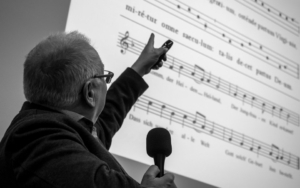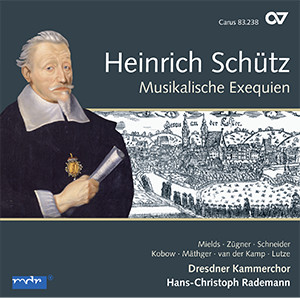Spectacular work and profound composition
A drama of faith in music, in the face of death, for Schütz composed by “dramatising” the text. All in all, these Exequien are a work of mourning and comfort – Baroque music which continues to speak to Meinrad Walter, professor of theology and liturgy at the Freiburg Musikhochschule, today in its emotion-laden urgency and its magnificent interpretation of the Bible.
In Baroque music there are spectacular works and profound compositions. The Musikalische Exequien by Heinrich Schütz is both. Or does it perhaps have a spectacular kind of profundity?
“Exequien” comes from the word exsequi, to carry out, and since time immemorial it has referred to the funeral cortège accompanying the coffin to the grave, together with the music which is heard such as the antiphon “In paradisum”. Prince Heinrich Posthumus of Reuss (1572–1635) had planned his funeral in minute detail during his lifetime: he had engaged the chaplain and had his coffin embellished with numerous passages of scripture. Heinrich Schütz was commissioned by the Prince to set to music these same passages from the Bible and verses from hymns. The result was a three-part composition, one of the most famous settings of funeral music of all time.
All the senses come into play if – at least in spirit – you walk around the coffin. For inscribed around it, texts from the Book of Wisdom can be read in Luther’s translation: “Der Gerechten Seelen sind in Gottes Hand und keine Qual rühret sie an; für den Unverständigen werden sie angesehen, als stürben sie, und ihr Abschied wird für eine Pein gerechnet, und ihr Hinfahren für Verderben; aber sie sind in Frieden!” (“Now we know the righteous are in God’s own hand, and there no pain comes upon them. In the eyes of foolish men, men of no understanding, they seemed to die: but they have peace and safety. Their departure was accounted pain and sorrow, and their going forth their destruction: but they have peace and safety.”) Then: “Der Gerechten Seelen sind in Gottes Hand …”.
Heinrich Schütz composed by “dramatising” the text. He made the choir into the voice of this ars moriendi – a saying on the art of dying from the Book of Wisdom. In particular he made the bass into the ‘Unverständigen’ (the ‘foolish man’), one who not only sings but also hears, because faith comes from listening (Romans 10,17). Two sopranos sing the promise to him, almost beguilingly: “… but they have peace and safety”. And at the end the bass sings with them, because he is able to absorb both the musical and biblical message. A drama of faith in music, in the face of death.
In the third part of the work Schütz reveals who this scoring of bass and two sopranos is meant to represent: the “beata anima cum seraphinis”, the happy soul with the seraphim, who accompany them on the last journey to the grave and the culmination with the singing of the “In paradisum”. All in all, these Exequien are a work of mourning and comfort – Baroque music which continues to speak to me today in its emotion-laden urgency and its magnificent interpretation of the Bible.
Prof. Dr. Meinrad Walter is church music advisor to the Archdiocese of Freiburg, and teaches theology and liturgy at the Freiburg Musikhochschule. He has a particular interest in the interdisciplinary study of music and spirituality. He has published widely and given many workshops on this.







Leave a Reply
Want to join the discussion?Feel free to contribute!